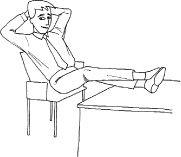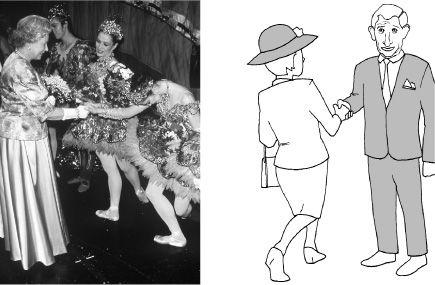The Definitive Book of Body Language (51 page)
Read The Definitive Book of Body Language Online
Authors: Barbara Pease,Allan Pease

The doorway intimidator
Some people are habitual doorway leaners and go through life intimidating everyone from first introduction. These people are well advised to practice an upright stance with palms visible to create a favorable impression on others. Others form up to 90 percent of their opinion about us in the first four minutes and you never get a second chance to make a first impression.

Michael Jackson's purpose in his infamous “baby dangling” incident was to close the distance between the baby and the fans so that they could experience temporary “ownership” of the baby He just overlooked the distance between the baby and the ground
If the boss's chair has no arms— which is unlikely as this is usually a feature of the visitor's chair—he may be seen with one or both feet on the desk. If his superior enters the office, it is unlikely that the boss—who is now the subordinate—would continue to use such an obvious territorial/ownership gesture, but instead would resort to more subtle versions such as putting his foot on the bottom drawer of his desk, or, if there are no drawers in the
desk, placing his foot hard against the leg of the desk to stake his claim to it.

Claiming ownership of the desk
Historically, raising or lowering the height of your body in front of another person has been used as a means of establishing superior-subordinate relationships. We refer to a member of royalty as “Your Highness,” whereas individuals who commit unsavory acts are called “low,” “low-down,” and “lowlifes.” No one wants to be described as “shortsighted,” be “looked down on,” or “fall short” of their targets. The protest rally speaker stands on a soapbox to be higher than everyone else, the judge sits higher than the rest of the court, the Olympic gold-medal winner stands higher than the other medal winners, those who live in a penthouse command more authority than those who live at ground level, some cultures divide their social classes into the “upper class” and “lower class,” and pharmacists stand eighteen inches above everyone else.
Superior people can sometimes get on their “high horses,” “rise to the occasion,” “put themselves on a pedestal,” or become “high and mighty.” And no self-respecting God would ever live down in the boondocks, on the salt flats, or in the valley. They live in Valhalla, on Mount Olympus, or in Heaven above. And everyone understands the significance of standing to speak to a meeting to gain control.

We reduce our height to show subordination to
others and increase height to gain status
Most women curtsey when they meet royalty and men incline their heads or remove their hats, making themselves appear smaller than the royal person. The modern salute is a relic of the act of removing a hat to make oneself appear shorter. The person symbolically goes to remove their hat and the salute is the modern result. Today's hatless man can still be seen giving a simple tap to his forehead when he meets a woman, as a relic of his hat-doffing ancestors' habit. The more humble or subordinate an individual feels toward another, the lower he stoops his body.
Some people described Roger as the backbone
of the organization. Others didn't go that high.
Some Japanese businesses have reintroduced the “bowing machine,” which teaches staff the exact angle to bow to a customer, usually fifteen degrees for a customer who is “just looking” and up to forty-five degrees for a purchaser. In business,
the people who continually “bow” to the management are labeled with derogatory name-tags such as “bootlickers,” “crawlers,” and “brownnosers.”
Despite what it may be politically correct to believe about height, studies convincingly show that taller people are more successful, healthier, and live longer than short people. Dr. Bruce Ellis, Head of Experimental Psychology at the University of Canterbury in New Zealand, found that taller men also have greater reproductive success than shorter men, not only because increased testosterone levels are linked to tallness but also because women choose men who are taller than they are as partners. Taller men are seen as more protective and can pass this advantage on through their genes. Men prefer shorter women because it gives men the apparent height advantage.
The shorter you are the more likely it is that you will be interrupted by men. One of our clients, a five-feet-one-inch female senior manager in a predominately male accounting firm, complained that she was continually being interrupted by her peers at management meetings and it was rare for her to present her ideas fully or even finish her sentences. We devised a strategy that required her to stand and go to the coffee table and, when she returned to her seat, remain standing as she spoke and presented her thoughts. She was amazed at the difference it made to how she was received. While she can't use the coffee routine every time, it allowed her to see how, by simply adjusting her height perspective, she could gain more authority.
You always see taller men with shorter
women, but rarely the reverse.
In our seminars, we constantly observe how top-level managers are significantly taller than everyone else. Through the Institutes of Management, we recorded the height and salaries of 2566 managers at company director level and found that every inch of height above the company norm added almost $683 to that person's salary package, regardless of whether the person was a man or a woman. Research in the U.S.A. showed that height is also linked to financial success: on Wall Street, every inch of height added $583 to each person's bottom line. The same correlation has even been found in government departments and universities, who supposedly promote people based on their competence level and equality, not their height. One American study showed that tall people not only got the best jobs in American firms, they received higher starting salaries. Those over six feet two inches got 12 percent more than those under six feet.
People who are “perceived” as tall also do better in politics on television: on-screen people are only six inches tall, so we are left subconsciously to decide how tall the person really is. The height we decide they are and the amount of power we give them is directly related to the power and authority of their presentation. This is why so many short actors, politicians, and personalities do so well on television—they simply act tall. For example, Australian Prime Minister John Howard became stuck with the nickname “Little Johnny” because, on television, his approach was softer and quiet. Our surveys found that the voting electorate perceived him as five feet six inches— reasonably short for a man—whereas in fact he was five feet nine inches. One of his adversaries, former Prime Minister Bob Hawke, was constantly seen as over six feet tall, as he always gave a “big” performance. In fact, he was five feet seven inches tall.
On television, a strong performance
makes you seem taller.
Pioneering research by Wilson (1968) found that when a student addressed other students, he would be seen as five feet eight and a half inches tall by the other students. When the same student was introduced as a professor, the audience perceived him as six feet three inches tall. A powerful performance or an impressive title both lead to you being perceived as taller.
If you want to test the authority that goes with height, try this exercise with a friend. First, lie on the floor and get your friend to stand over you to maximize the height difference. Next, ask your friend to reprimand you as loudly and forcefully as he can. Then change positions—you stand, he lies down—and ask him to repeat his reprimand. You'll find that not only does he find it nearly impossible to do, his voice will sound different and he'll lack any authority while trying.
Being tall, however, is not always a bonus. While tall people often command more respect than short people, height can also be detrimental to some aspects of one-to-one communication, for instance, where you need to “talk on the same level” or have an “eye-to-eye” discussion with another person and do not want be perceived as “too big for your boots.”
In Britain, Philip Heinicy, a six-feet-eight-inches-tall chemical salesperson, formed the Tall Person's Club to promote the practical, medical, and social needs of the taller members of society. He found that his height was threatening to his customers; they felt imposed upon and could not concentrate on
what he had to say. He discovered that when he gave a sales presentation in a seated position, not only did the atmosphere become more conducive to good communication, the removal of his physical threat also increased his bottom-line sales by a whopping 62 percent.
There are some circumstances in which lowering your body can be a dominance signal. This happens when you slouch down and make yourself comfortable in an easy chair in another person's home while the owner is standing. It's the complete informality on the other person's territory that communicates the dominant or aggressive attitude.
A person will always be superior and protective on his own territory, especially in his own home, and so practicing submissive gestures and behavior is effective for getting the person on your side.
For over three decades, we have advised people who appear in the public eye on how to be seen as credible and believable. They have ranged from rock stars and politicians to weather forecasters and prime ministers. On one occasion, two political leaders were invited to give two television debates about how they would run the country. One candidate—call him candidate A—was five feet nine inches and was seen by voters as shorter due to his milder, quieter approach, while his competitor—candidate B—was six feet two inches and perceived by the electorate as even taller due to his assertive, authoritative attitude. After the first TV debate, the shorter candidate was seen as having lost badly to the taller one. Candidate A called us for advice and we suggested a number of strategies
including cutting four inches off his lectern, which would give the same visible distance between the top of the lectern and his chin as candidate B had. We also suggested that A should arrange for his TV camera to be slightly lowered to shoot upward, giving him a taller appearance. We told him to pitch his message directly to the camera so that each voter felt as if they were being addressed personally. It worked. After the next debate, candidate A was seen as being the clear winner and the media reported that he “had a new sense of authority and leadership.” After the election that followed, candidate A became leader of the country. The lessons here were that voters generally aren't deeply interested and don't remember much of what politicians say in election debates. Voters cast their final vote based on the belief that the winner is best suited to be the leader.